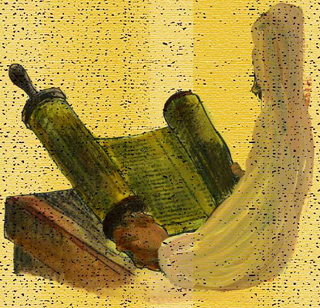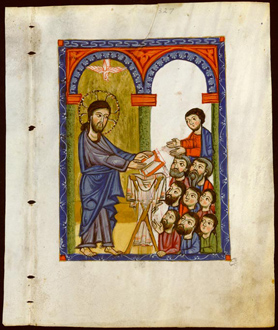For Sunday January 27, 2019
Lectionary Readings (Revised Common Lectionary, Year C)
Nehemiah 8:1-3, 5-6, 8-10
Psalm 19
1 Corinthians 12:12-31a
Luke 4:14-21
One of the first songs I learned in Sunday School was called, “Read Your Bible, Pray Every Day.” It required us (then) preschoolers to curl up small and tight on the carpeted floor of our Children’s Chapel — like seeds full of promise — and slowly unfurl as we sang, “Read your Bible, pray every day, pray every day, pray every day. Read your Bible, pray every day, and you’ll grow, grow, grow.” With each “grow,” we were supposed to shoot up from the carpet a few inches, until finally we were on our tippy-toes with our hands in the air, straining for the ceiling.
Verse One was an invitation. If it didn’t convince us, there was a cautionary Verse Two: “Don’t read your Bible, don’t ever pray, and you’ll shrink, shrink, shrink.” I actually liked the second verse better; I’d compete with my classmates to see who could shrink the smallest and fastest. (As I was short for my age, I usually won.)
Depending on what kind of faith (or non-faith) tradition you grew up in, this early introduction to the Bible might sound familiar — or radically strange. I have Christian friends whose relationship with the Bible is reverent but remote; they read it only on holidays, or on special family occasions like baptisms. I have others who feel guilty that the book is gathering dust on their bookshelves, but find it too bewildering or triggering to crack open. I even have one friend whose mother actively discouraged her from reading the Bible when she was a teenager, for fear that it would ruin her faith.
For my part, I grew up reading the Bible compulsively, as if Jesus’s approval of me depended on it. As if the ancient book had fallen straight out of the sky with my name on the cover. As if its meaning (singular) were obvious. As if it were (to borrow a common acronym), essential for my success and survival: Basic Instructions Before Leaving Earth.
 |
In time, this intense and naïve relationship soured. My questions about the Bible’s reliability, historicity, interpretation, and misuse grew so thick and convoluted that I couldn’t approach the book without fuming. For a long time, I put my copy away, and nearly hyperventilated if I heard other people reading certain sections of it aloud. I no longer knew what it meant to “grow” as a result of engaging with the Bible. So I shrank. I shrank away.
All of this to say, I come to the lectionary this week — a lectionary featuring two detailed scenes of Bible reading — from a complicated place. These days, my relationship with God’s Word is contested and fraught. I respect it, but I also wrestle with it. So I was surprised — very surprised — when I read the lectionary and had the reaction I had. The only definitive thing I can share with you is that both Bible reading scenes stopped me in my tracks. Both brought me to tears. Both re-awakened a hunger for “the Good Book” and filled me with a fresh sense of urgency about “growing” into its pages. Whether the scenes will do the same for anyone else, I can’t say. But I’m happy this week to share what I’ve noticed and experienced.
The first scene is from the Old Testament book of Nehemiah, and it describes a beautiful and hard won moment in Israel’s history. Some quick backstory: Nehemiah is a minor figure in the court of Artaxerxes, the king of Persia. When Nehemiah hears that Jerusalem is a broken, fire-razed wreck, he begs the king to let him return to his homeland and rebuild the city of his ancestors. The obstacles to the rebuilding are fierce and numerous, but Nehemiah persists, and finally succeeds in restoring Jerusalem’s wall and gates. He then invites his people back from exile, and asks them to gather in the square before the Water Gate for an assembly.
Our lectionary picks up there, at the moment when the prophet Ezra “opens the book in the sight of all people,” and reads from the law of Moses “from early morning until midday.” He reads until the assembly of men and women gathered in the square open their ears, understand, stand up, raise their hands, worship “with their faces to the ground,” say, “Amen, Amen,” weep as they hear the words God has for them, and then return to their homes to “eat the fat and drink sweet wine and send portions to those for whom nothing is prepared,” because “the joy of the Lord is their strength.”
 |
It’s an astonishing image of a communal Bible reading experience that takes a diverse group of people on a journey from attentiveness to comprehension to affirmation to wonder to grief to worship to joy to celebration. I read it over and over again with an aching sense of need, desire, and envy. When was the last time I read the Bible with such sustained attentiveness and expectation? When was the last time I savored the sweetness and the sorrow it contains? When was the last time I trusted God’s Word to tell me my story; to hold, recognize, and contain me; to name the contours of my past, present, and future — in ways that brought me to my knees in relief and gratitude? When was the last time I allowed the Good Book to draw me so deeply into community that I couldn’t help but celebrate and share the goodness of God with other people afterwards?
Something powerful and transformative happens when Ezra opens the book. What happens is not magic. Neither is it manipulation. What happens is that the people consent to listen to God’s Word with their whole hearts, to receive what’s read in a spirit of openness and vulnerability, and to express their comprehension in acts of celebration and sharing.
What would it be like to open the book and find such authentic joy?
The second scene takes place centuries later, in the backwater town of Nazareth. It’s a Sabbath day soon after Jesus’s baptism and subsequent temptation in the wilderness. “Filled with the power of the Spirit,” Jesus returns to his hometown, enters the synagogue he has likely attended since boyhood, and stands up (as is the custom) to read from the Prophets. He asks for the scroll of the prophet Isaiah, unrolls it, finds the passage he wants, and reads aloud. By the time he’s finished reading (the Gospel of Luke tells us), every eye in the synagogue is fixed on him.
Luke offers us this reading scene as the inaugural act of Jesus’s ministry. An act in which he proclaims his identity, his purpose, and his vocation. What I love about the scene is that Jesus chooses to reveal the meaning of his life and work through the beloved and well-worn words of Scripture. Words his audience has heard a thousand times. Words no doubt rich with communal memory and meaning, but also words in danger of losing their power through over-familiarity. It’s not as if the Son of God is incapable of penning a new and shiny mission statement; he is the Incarnate Word himself. But he doesn’t improvise; he opens the book and makes the old words of the tradition his own: “God has sent me to proclaim release to the captives and recovery of sight to the blind, to let the oppressed go free, to proclaim the year of the Lord’s favor.” As if to say: the Word lives, here and now. It is organic, it breathes, it moves in fresh and revolutionary ways. The Word of God is neither dull nor dead. It is alive.
 |
Of course (as we will see in next week’s lectionary) the opening of the book doesn’t always go smoothly for those bold enough to attempt it. Unlike the assembly that joyfully receives Ezra’s reading, Jesus’s audience recoils in shock and outrage when he makes the words of Scripture his own. And yet just for a moment, when Jesus stands before them, unrolls the scroll, and reads, they find themselves riveted.
As I contemplate this second scene, I wonder if the Bible is fresh or dull, organic or stagnant, alive or dead, in my spiritual perception. Is the Bible a go-to book I open when I’m searching for meaning and purpose? Do I allow it to shape my core longings? Would I ever search its pages — as Jesus did — in order to find and name my vocation?
For me, the danger is over-familiarity. A cynical refusal to be surprised by a book I’ve known since I was a little kid in Sunday School, “growing” and “shrinking.” For others of us, the danger might be unfamiliarity. Or apathy. Or fear.
And yet for all of us, the challenge remains to unroll the scroll. To read and receive. To find “the joy of the Lord” in a collection of ancient pages brimming with the life and testimony of the Holy Spirit. If we can do these things, then we will be released to share God's abundance with others, and our worship will become a feast.
This is the beautiful and unending invitation. What happens when you open the book?
Image credits: (1) Bible History Online; (2) Seattle Pacific University; and (3) Bible HIstory Online.





